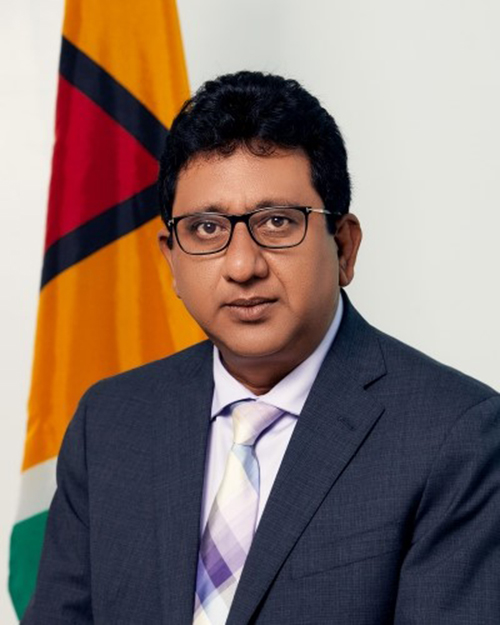The Attorney General’s Chambers has started preparations for work related to the petroleum sector with a number of training programmes and plans for the establishment of a unit dedicated to oil and gas legal work.
Minister of Legal Affairs and Attorney General Anil Nandlall SC says that he hopes that other ministries follow suit with respective specialised training as this country is expected to expand developmentally and will need specialists in all respective fields.
“The staff of the Legal Affairs Ministry and Attorney General’s Chambers are receiving specialized education and training and that will go on as an ongoing exercise in the area of the petroleum sector and various others disciplines. The ultimate objective is to build a reservoir of expertise from which specialized units can be established to focus in specific areas of the law, including the oil and gas sector,” Nandlall told the Sunday Stabroek in an interview.
“Similarly, we will have a unit to represent the state’s assets in arbitration proceedings. I personally would like to see similar specialisation in similar branches of the law,” he added.
Already, Nandlall said that the technical staff of the legal affairs ministry, including the litigation unit as well as the drafting department, have so far benefited from two sets of lecture series on oil and gas law. These lectures were delivered by experts in the area attached to the University of the West Indies.
“As part of that lecture series, very elaborate notes and worksheets were specifically designed for Guyana’s context and circumstances and we have them in hard copies in our library as well as soft copies in our online library and data base,” the Attorney General informed.
He added, “Also, I have requested assistance from the Indian High Commission for available online scholarships in post-graduate legal studies in the area of oil and gas and related areas such as the environment and management of these sectors as well as in new areas which will be relevant to Guyana’s developmental trajectory”. Nandlall cited the area of arbitration as an example.
He said that additionally the staff of the Attorney General’s Chambers will also benefit from government scholarship programmes.
With the specialised training, Nandlall believes that this country’s legal team will be aptly equipped to deal with matters , not only in the petroleum sector in the future and would not have to rely exclusively on external help.
“I think that it will significantly improve the state’s ability to offer legal services to the various organs of government,” the Attorney General said.
Guyana’s laws on petroleum exploration and production date back to the 1980s. The Petroleum (Exploration and Production) Act 1986 and its related Regulations form the main legislative and regulatory framework for the ‘exploration, exploitation, conservation and management of petroleum existing in its natural condition in land in Guyana, including the territorial sea, continental shelf and exclusive economic zone of Guyana’. The Guyana Geology and Mines Commission (GGMC) is responsible for planning and securing the development, exploitation and management of petroleum and to ensure that the citizens of Guyana derive the maximum benefit from such resource.
Nandlall had earlier this month told this newspaper that the planned crafting of a legislative agenda will be done through a consultancy advertised then.
While oil was discovered in commercial quantities since May 2015, the archaic Petroleum (Exploration and Production) Act, 1986 and its related Regulations form the main legislative and regulatory framework for all petroleum activity here.
The David Granger-led APNU+AFC government had waited four years to announce, when it was just three months away from the March 2nd , 2021 General Elections, that it was nearing a deal with a consultancy to help overhaul the legislative framework for the oil and gas industry.
However, the elections impasse saw that process put on hold and the APNU+AFC government lost the elections, with the PPP/C taking the reins of government in August 2020. It was never disclosed which firm would have helped.
Shortly after his swearing in last year August, Minister of Natural Resources Vickram Bharrat had said that petroleum legislation was high on the government’s agenda. He had especially singled out the Petroleum Commission Bill and the Natural Resources Fund (NRF) Act as two pieces of legislation to be addressed swiftly.
In October last year, he had again stressed the importance of laws to guide the sector and told this newspaper that the NRF Act would most likely be repealed sometime this year. Thus far there has been no progress on these two pieces of legislation.
Nandlall has said that the focus last year was on local content and that government wanted holistic planning for the sector. He explained that there was a “necessary delay” in the process moving ahead because “we had to do the consultation for the local content policy to inform the legislation”.
He said that government did not want the process done “piecemeal” and as such all will be done simultaneously since the benefits together outweigh piece-by-piece legislative crafting.
“We didn’t want piecemeal. We are looking at it holistically, and this is for a number of reasons. Having one consultancy will impact cost and speed in which the exercise will be completed,” he said.






